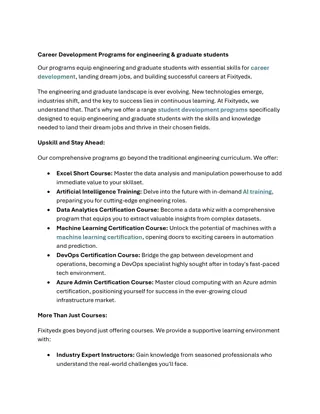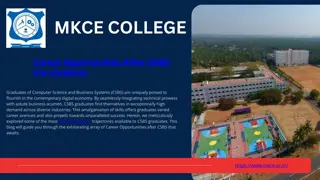
What is Computer Engineering_ Career Jobs and Opportunities
Computer engineering is a dynamic field that blends the principles of electrical engineering and computer science to design, develop, and maintain computer systems. This discipline plays a crucial role in the modern digital age, as it focuses on both
Download Presentation

Please find below an Image/Link to download the presentation.
The content on the website is provided AS IS for your information and personal use only. It may not be sold, licensed, or shared on other websites without obtaining consent from the author. If you encounter any issues during the download, it is possible that the publisher has removed the file from their server.
You are allowed to download the files provided on this website for personal or commercial use, subject to the condition that they are used lawfully. All files are the property of their respective owners.
The content on the website is provided AS IS for your information and personal use only. It may not be sold, licensed, or shared on other websites without obtaining consent from the author.
E N D
Presentation Transcript
What is Computer Engineering? Career Jobs and Opportunities Computer Engineering combines principles from electrical engineering and computer science. It focuses on designing and developing computer systems, hardware, and software.
Key Areas Hardware Engineering: Design and development of physical components. Software Engineering: Creation and optimization of software systems. Embedded Systems: Integration of software and hardware for dedicated functions. Skills Required 1. Proficiency in programming languages such as C++ and Java. 2. Knowledge of digital systems and microprocessors. 3. Understanding of software development lifecycle. 4. Problem-solving and analytical skills. Computer Engineering bridges the gap between software innovations and hardware capabilities. Core Concepts in Computer Engineering Computer engineering encompasses electrical engineering and computer science, focusing on developing hardware and software. Key areas include: 1. Digital Logic Design Circuit design, Boolean algebra, and logic gates. 2. Microprocessor Systems Programming, interfacing, and microcontroller applications. 3. Embedded Systems Design and implementation of dedicated function systems. 4. Computer Architecture Structure, behavior, and organization of computer systems. 5. Software Engineering Development methodologies, algorithms, and data structures. 6. Networking and Communications
Protocols, data transfer, and network architecture. 7. VLSI Design and Technology Integrated circuits and semiconductor devices. Educational Requirements for Computer Engineering To pursue a career in computer engineering, individuals typically need to complete several educational prerequisites: 1. High School Diploma or Equivalent: Foundational courses in mathematics, science, and computer science. 2. Bachelor s Degree: A degree in computer engineering, computer science, or a related field. 3. Internships: Hands-on experience through internships or cooperative education programs. 4. Certifications: Additional certifications can be beneficial, such as Cisco Certified Network Associate (CCNA) or CompTIA A+. 5. Advanced Degrees: Master s or Ph.D. for specializations or research-focused careers. 6. Continuing Education: Staying updated with the latest technologies and trends through workshops and courses. Possessing a strong foundation in these areas ensures readiness for a successful career in computer engineering. Key Skills for Computer Engineers Computer engineers must possess a blend of skills to excel in their roles. Key skills include: Programming Languages: Proficiency in languages such as C++, Java, and Python.
Hardware Knowledge: Understanding of circuits, processors, and embedded systems. Software Development: Expertise in designing, testing, and debugging software systems. Problem-Solving: Analytical skills to diagnose and resolve complex issues. Mathematics: Strong foundation in calculus, linear algebra, and statistics. Networking: Knowledge of network architecture and protocols. Project Management: Ability to manage time and resources efficiently. Communication: Strong verbal and written communication skills for collaboration. Specializations in Computer Engineering Computer Engineering offers a broad range of specializations. Hardware Engineering: Focuses on designing and developing physical components. Software Engineering: Involves creating and maintaining software applications. Network Engineering: Deals with optimizing and maintaining network infrastructures. Embedded Systems: Specializes in integrating software and hardware in compact devices. Cybersecurity: Concentrates on protecting systems from digital threats. Robotics: Focuses on designing automated systems and robots. Data Science: Involves analyzing and interpreting complex data sets using algorithms. Each specialization demands unique skills and expertise, paving diverse career paths.
Software Development Software development involves creating applications and systems that run on computers and other devices. Computer engineers in this field focus on: Writing and testing code. Debugging software to ensure functionality and performance. Developing algorithms that solve specific problems. Ensuring software compatibility across various platforms. Collaborating with designers and other engineers. They use programming languages like Java, C++, Python, and more. Additionally, tasks may include: 1. Requirements analysis. 2. System design. 3. Implementation. 4. Maintenance and updates. Software development requires strong problem-solving skills and attention to detail. It is critical in industries such as finance, healthcare, and technology. Hardware Development Hardware development in computer engineering involves creating physical components to support computing functions. Engineers design, test, and refine prototypes. Key Activities: Circuit Design: Crafting electronic circuits that achieve desired functions. Prototyping: Developing early versions to test component performance.
Integration: Combining hardware components for optimal system functionality. Testing & Debugging: Identifying and resolving issues in hardware performance. Manufacturing: Overseeing production processes for mass hardware production. Required Skills: Analytical Thinking Attention to Detail Knowledge of Electronics Proficiency in CAD tools Problem-Solving Abilities Hardware development plays a critical role in advancing technology. Network Engineering Network engineers design, implement, and manage computer networks that support in-house voice, data, video, and wireless network services. These professionals ensure network performance and security. Key Responsibilities: Designing and deploying functional networks (LAN, WAN, WLAN, VPN) Configuring and installing software, servers, routers, and other network devices Monitoring network performance to optimize efficiency Troubleshooting, diagnosing, and resolving hardware, software, and other network issues Essential Skills: Strong understanding of network infrastructure and architecture Proficiency in network protocols (TCP/IP, DNS, DHCP) Experience with network diagnostic tools
Knowledge of firewalls and security measures Network engineers are integral in maintaining seamless and secure connectivity within organizations. Embedded Systems Embedded systems refer to specialized computing systems that perform dedicated functions within larger mechanical or electrical systems. These systems are commonly utilized in a variety of applications, ranging from consumer electronics to industrial machines. Embedded systems engineers focus on designing, optimizing, and implementing hardware and software solutions to increase efficiency and functionality. Key Responsibilities System Design: Conceptualizing and developing hardware schematics and software algorithms. Programming: Writing firmware using languages like C/C++ and assembly language. Testing: Conducting rigorous testing for reliability and performance. Integration: Ensuring seamless communication between different components. Career Opportunities Automotive: Developing control systems for vehicles. Healthcare: Creating medical devices like pacemakers. Consumer Electronics: Designing smart home devices. Telecommunications: Enhancing networking equipment. Key Industry Tools and Technologies Computer engineers utilize an array of tools and technologies critical to their field. These tools include:
Integrated Development Environments (IDEs): Examples include Visual Studio, Eclipse, and IntelliJ IDEA for coding. Hardware Description Languages (HDLs): VHDL and Verilog are essential for designing and testing integrated circuits. Simulation Software: Tools like MATLAB and Simulink enable engineers to simulate and analyze complex systems. Version Control Systems: Git and SVN facilitate collaboration and version tracking in software development. Microcontrollers and Microprocessor Systems: Arduino, Raspberry Pi, and FPGA boards are instrumental in building and testing embedded systems. Top Universities for Computer Engineering Several universities offer renowned programs in computer engineering. These institutions provide cutting-edge research facilities and comprehensive curriculums. Massachusetts Institute of Technology (MIT) Known for its rigorous programs and innovative research in artificial intelligence and cybersecurity. Stanford University Renowned for its proximity to Silicon Valley, emphasizes entrepreneurship and innovation. University of California, Berkeley Notable for advanced research in hardware design and software engineering. Carnegie Mellon University Specializes in robotics and machine learning, offering extensive lab resources. California Institute of Technology (Caltech) Focuses heavily on experimental computing and theoretical frameworks.
Career Paths in Computer Engineering Computer engineering offers a range of career opportunities for professionals with the right skills and education. 1. Software Development Engineer: Focuses on creating and maintaining software applications. 2. Hardware Engineer: Designs and tests computer hardware components. 3. Systems Analyst: Evaluates and improves computer systems for organizations. 4. Network Architect: Designs and manages communication networks, including intranets and extranets. 5. Cybersecurity Specialist: Protects systems and networks from cyber threats. 6. Embedded Systems Engineer: Develops systems to perform specific tasks within larger mechanical or electrical systems. 7. Research Scientist: Conducts advanced research in computing technology and methodologies. Common Job Roles for Computer Engineers Computer engineers often find themselves in diverse roles due to the broad applications of their expertise. Some common positions include: Software Developer: Designs, tests, and improves software programs. Hardware Engineer: Develops and tests computer hardware components. Systems Analyst: Analyzes and designs IT systems to solve business problems. Network Engineer: Manages and maintains computer networks to ensure optimal performance. Security Analyst: Protects systems and networks from cyber threats.
Embedded Systems Engineer: Develops specialized computing systems within devices. AI/Machine Learning Engineer: Creates algorithms for intelligent behavior in machines. Data Scientist: Analyzes complex data sets to inform business strategies. Salary Expectations for Computer Engineers Computer engineers enjoy competitive salaries that vary based on experience, education, and location. Factors influencing compensation include: Experience Level: Entry-level positions typically range from $70,000 to $90,000 annually. Mid-level professionals can expect $90,000 to $120,000. Senior-level roles often exceed $120,000. Education: Higher degrees, such as a master s or PhD, potentially increase earning potential by 10-20%. Location: Geographic regions impact salaries. Metropolitan areas like San Francisco, New York, and Seattle tend to offer higher wages compared to smaller cities. Industry: Specialized sectors such as cybersecurity and artificial intelligence may offer premium salaries. Work Environment and Culture Computer engineers typically work in dynamic and collaborative environments. They often operate within interdisciplinary teams, involving software developers, hardware designers, and IT specialists. Workspaces: Common places include corporate offices, research labs, and tech startups.
Work Hours: Generally adhere to a standard 40-hour work week but can extend during project deadlines. Remote Work: Many enjoy flexible and remote working options. Dress Code: Varies from casual at startups to business casual in corporate settings. Team Dynamics: Emphasizes teamwork, problem-solving, and continuous learning. Professional Development: Encouraged through conferences, certifications, and advanced education. Future Trends in Computer Engineering Advancements in technology are driving the evolution of the computer engineering field. Key trends include: Artificial Intelligence and Machine Learning: Expanding roles in developing intelligent systems. Quantum Computing: Pioneering efforts in harnessing the power of quantum mechanics for processing. Edge Computing: Growing focus on decentralized data processing closer to data sources. Cybersecurity Innovations: Enhanced techniques to combat evolving threats. Sustainable Computing: Emphasis on eco-friendly hardware and energy-efficient designs. 5G and Beyond: Networking advancements facilitating faster and more reliable connectivity. Blockchain Technology: Increased implementation in securing and managing data. Professional Development and Certifications
Professional development is crucial in computer engineering. Engineers should obtain certifications to enhance their skills and marketability. Key certifications include: 1. Cisco Certified Network Associate (CCNA) 2. Certified Information Systems Security Professional (CISSP) 3. Microsoft Certified Solutions Expert (MCSE) 4. CompTIA A+ 5. Amazon Web Services (AWS) Certified Solutions Architect These certifications validate expertise in specific technologies and practices. Additionally, attending workshops, seminars, and webinars helps professionals stay updated on industry trends. Membership in professional organizations such as IEEE or ACM also offers opportunities for networking and continuous learning. Opportunities for Growth in Computer Engineering Computer engineering offers numerous avenues for professional development and specialization. Advanced Specializations: Areas such as artificial intelligence, cybersecurity, and quantum computing are rapidly evolving. Research and Development: Opportunities in R&D for groundbreaking technologies exist in academia and industry. Leadership Roles: Roles in project management and technical leadership within multinational corporations. Continued Learning: Pursuing certifications and advanced degrees to stay updated with the latest trends. Entrepreneurship: Founding tech startups to bring innovative ideas to market. Global Impact: Engaging in projects with international reach, including collaborative global initiatives.
Challenges and Considerations in the Field Computer engineering is not without its challenges. Key Challenges: 1. Rapid Technological Advancement: Professionals must constantly update their skills. 2. Complex Problem Solving: Engineers often tackle intricate issues requiring innovative solutions. 3. High Competition: The field is highly competitive, demanding excellence. 4. Ethical Considerations: Ensuring responsible use of technology is paramount. 5. Interdisciplinary Knowledge: Requires knowledge spanning electronics, software, and hardware. Crucial Considerations: Continuous Learning: Staying abreast of new technologies and methodologies is essential. Collaboration: Effectively working with multidisciplinary teams is critical. Adaptability: Being able to adapt to rapidly changing environments is crucial. Global Demand for Computer Engineers The expansive digitization of industries is driving a surge in demand for computer engineers worldwide. As technology continues to evolve, these professionals are essential for various sectors:
Healthcare: Developing sophisticated systems for patient management and diagnostics. Finance: Enhancing cybersecurity measures and financial technologies. Automotive: Creating advanced algorithms for autonomous vehicles. Telecommunications: Improving network infrastructure and connectivity. Entertainment: Innovating gaming, virtual reality, and streaming services. Governments and private enterprises are investing heavily in emerging technologies, thereby increasing job opportunities. The advent of artificial intelligence, big data, blockchain, and the Internet of Things (IoT) further augments the necessity for skilled computer engineers globally. Networking and Professional Associations Networking and involvement in professional associations offer computer engineers opportunities for growth and advancement. IEEE (Institute of Electrical and Electronics Engineers): Supports computer engineers through conferences, publications, and continued education. ACM (Association for Computing Machinery): Provides a platform for knowledge exchange and professional growth in the computing field. NSPE (National Society of Professional Engineers): Advocates for high professional standards and offers resources for career development. Community Meetups: Local tech meetups and hackathons provide collaboration and skill enhancement avenues. Online Forums: Platforms like Stack Overflow and GitHub engage professionals in problem-solving and project collaboration. Active participation in these organizations fosters professional connections and learning.
Freelancing and Entrepreneurial Opportunities Freelancing and entrepreneurial opportunities abound in computer engineering, leveraging technical skills in innovative ways. Freelancing Platforms: Skilled engineers can join platforms like Upwork, Fiverr, and Toptal to offer services, ranging from software development to IT consultation. App Development: Developing and marketing mobile or web applications enables engineers to monetize creativity directly. Tech Startups: Engineers can launch startups, providing unique tech solutions or products, securing venture capital, and expanding business. Consulting Services: Offering expert advice to businesses on technology implementation and optimization is another lucrative avenue. Open Source Contributions: Participating in or leading open-source projects can grow reputation and develop influence in the tech community. Final Thoughts Computer engineering offers a dynamic and rewarding career path. The field encompasses a variety of roles that require a strong foundation in both hardware and software engineering. Essential skills for computer engineers include: Proficiency in programming Understanding of circuit design Knowledge of systems architecture Computer engineers can work in diverse sectors such as: 1. Consumer electronics 2. Telecommunications
3. Finance Earning potential is significant, with opportunities for professional growth. Advancements in technology continually create new possibilities and challenges. Staying updated on industry trends through ongoing education and training is crucial for success. This field is ideal for those passionate about innovation and technology.






















